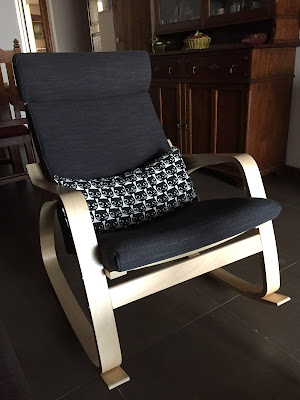As it happens, Basel’s a city I know well. It’s because I needed to consult documents in the university library here that I came to stay for a weeks in Hegenheim, just across the border in the French province of Alsace, way back in 1981. It was because I was in Hegenheim, that I met a pleasant nine-year-old who wanted to talk about the planets, and ended up spending the evening with him drawing a map of the solar system. It was because of that boy and that map that I met his mother. And, 37 years and two sons on, that boy’s my stepson and that mother’s my wife.
There was a place that did rather wonderful open sandwiches I knew, but it’s shut up shop and been replaced by a slightly garish bar. There was a sushi restaurant that tempted me but, hey, they’re two a penny around Europe now. Nothing special there, certainly. But then I saw a sign, on the door of a restaurant that looked definitely closed (lights off, chairs piled on tables): ‘roof terrace this way’.
 |
| Door to the sun terrace |
I climbed a flight of stairs, then another, then a third. The encouraging signs kept urging me upwards. I emerged on a kind of high courtyard that would have been completely open to the sky had a large portion of it not been covered by canvas awnings. Another set of steps took me to the very top, close enough to the canvas to touch it, and where I could see out to a narrow vista of three or four roof tops and typical Basel house walls, plastered and moulded and painted attractive colours.
Hardly had I placed my order and wondered whether the awnings would actually hold out the rain, when the elements provided me with a conclusive answer.
They wouldn’t.
 |
| The sun terrace turning into a rain terrace |
The waiter was good enough to rub down my table from time to time, even wiping the surface of my increasingly moist Kindle – if I have to eat alone I do find being able to read while I do it is the only way to make the experience pleasurable. But I ate my way stoically through my excellent first course despite the increasing evidence that the position was becoming untenable.
 |
| Excellent first course. Note the raindrops in the background |
Things finally came to a head when that same waitress wondered whether I really needed another bottle of water, but couldn’t instead just leave my glass on the table a while to see it fill up all by itself.
I retreated, Brit or no, to the slightly better shelter offered by the roof courtyard below. And there enjoyed my equally excellent second course.
It was over the chocolate mousse that I heard the waitress explaining to another client that the lease on the building was being terminated and within a few weeks the restaurant would close. She seemed unfazed by the knowledge – ‘it was very badly run,’ she announced – but to me it seemed sad that a place I’d discovered after 37 years was only going to last a short time longer. It was called Atlantis, oddly enough, and it seems I’ve merely caught a glimpse of it before it’s swallowed up by the waves.
Pity after serendipity, I suppose. But at least Basel gave me my wife and she’ll still be there when I head home the day after tomorrow. With a story about a certainly rather different – perhaps, indeed, special – dinner experience to tell her.





















